Applying Mixed Methods Research to Business: Ethical Influence, BBS301
VerifiedAdded on 2022/08/24
|13
|2768
|15
Report
AI Summary
This report, a systematic literature review, investigates the influence of ethical considerations on customer purchase behavior. It begins with an introduction outlining the research aim, objectives, and questions. The methodology section details the search strategy, including search terms, databases used (Google Scholar), inclusion/exclusion criteria, and the systematic approach to literature review. The literature review explores ethical considerations and social sustainability in food purchase choices, improved communication for ethical purchases, and community-based approaches towards sustainable purchases. The analysis draws on existing research, including the Hunt and Vitell’s General theory of Marketing Ethics, and discusses gaps in the literature regarding the impact of ethical considerations on consumer purchase decisions and social accountability. The report includes a conclusion summarizing key findings, identifies literature gaps, and provides a comprehensive bibliography and summary table of the reviewed articles.

Running head: APPLYING MIXED METHODS RESEARCH TO BUSINESS
APPLYING MIXED METHODS RESEARCH TO BUSINESS
Name of the Student:
Name of the University:
Author note:
APPLYING MIXED METHODS RESEARCH TO BUSINESS
Name of the Student:
Name of the University:
Author note:
Paraphrase This Document
Need a fresh take? Get an instant paraphrase of this document with our AI Paraphraser
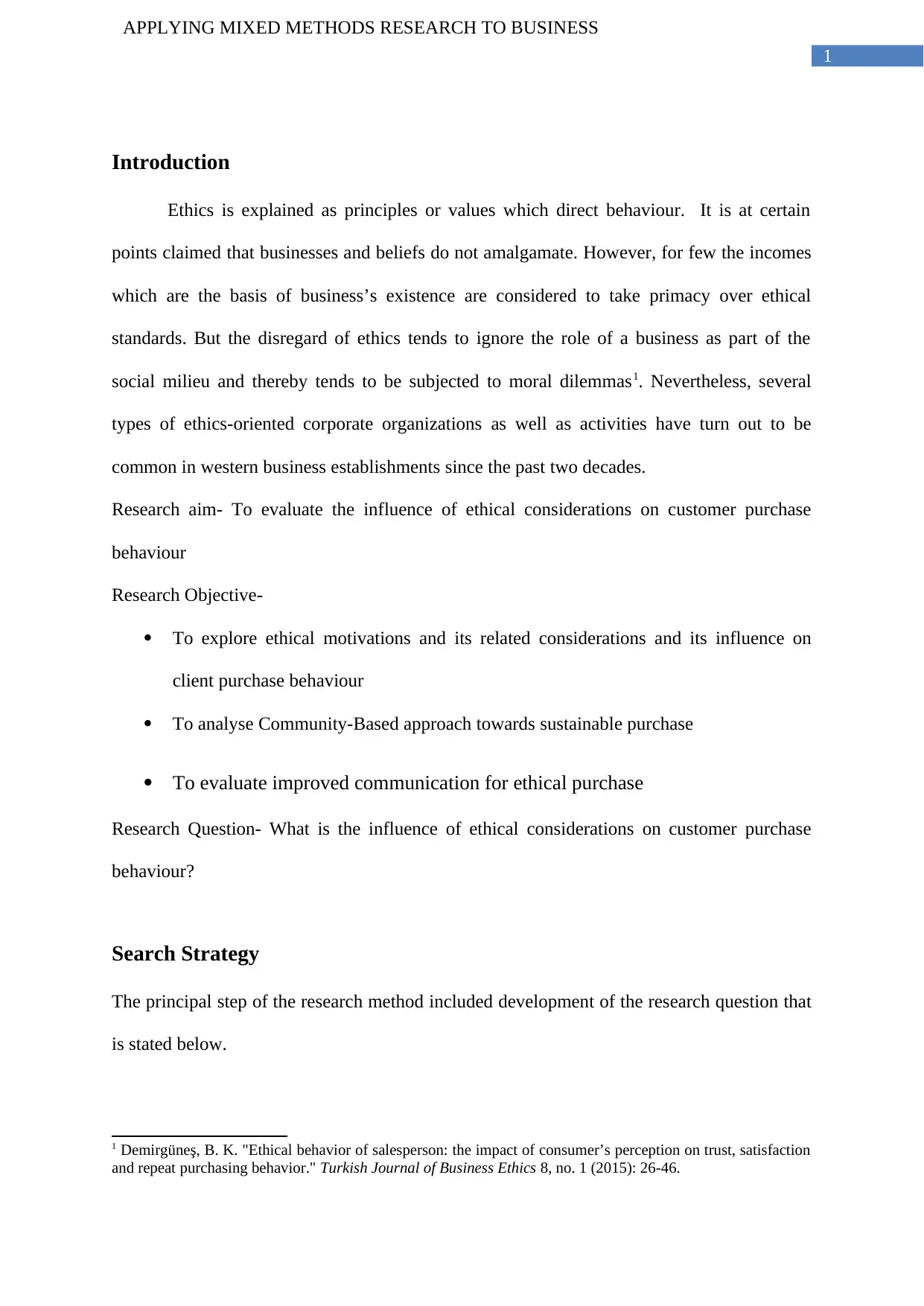
1
APPLYING MIXED METHODS RESEARCH TO BUSINESS
Introduction
Ethics is explained as principles or values which direct behaviour. It is at certain
points claimed that businesses and beliefs do not amalgamate. However, for few the incomes
which are the basis of business’s existence are considered to take primacy over ethical
standards. But the disregard of ethics tends to ignore the role of a business as part of the
social milieu and thereby tends to be subjected to moral dilemmas1. Nevertheless, several
types of ethics-oriented corporate organizations as well as activities have turn out to be
common in western business establishments since the past two decades.
Research aim- To evaluate the influence of ethical considerations on customer purchase
behaviour
Research Objective-
To explore ethical motivations and its related considerations and its influence on
client purchase behaviour
To analyse Community-Based approach towards sustainable purchase
To evaluate improved communication for ethical purchase
Research Question- What is the influence of ethical considerations on customer purchase
behaviour?
Search Strategy
The principal step of the research method included development of the research question that
is stated below.
1 Demirgüneş, B. K. "Ethical behavior of salesperson: the impact of consumer’s perception on trust, satisfaction
and repeat purchasing behavior." Turkish Journal of Business Ethics 8, no. 1 (2015): 26-46.
APPLYING MIXED METHODS RESEARCH TO BUSINESS
Introduction
Ethics is explained as principles or values which direct behaviour. It is at certain
points claimed that businesses and beliefs do not amalgamate. However, for few the incomes
which are the basis of business’s existence are considered to take primacy over ethical
standards. But the disregard of ethics tends to ignore the role of a business as part of the
social milieu and thereby tends to be subjected to moral dilemmas1. Nevertheless, several
types of ethics-oriented corporate organizations as well as activities have turn out to be
common in western business establishments since the past two decades.
Research aim- To evaluate the influence of ethical considerations on customer purchase
behaviour
Research Objective-
To explore ethical motivations and its related considerations and its influence on
client purchase behaviour
To analyse Community-Based approach towards sustainable purchase
To evaluate improved communication for ethical purchase
Research Question- What is the influence of ethical considerations on customer purchase
behaviour?
Search Strategy
The principal step of the research method included development of the research question that
is stated below.
1 Demirgüneş, B. K. "Ethical behavior of salesperson: the impact of consumer’s perception on trust, satisfaction
and repeat purchasing behavior." Turkish Journal of Business Ethics 8, no. 1 (2015): 26-46.
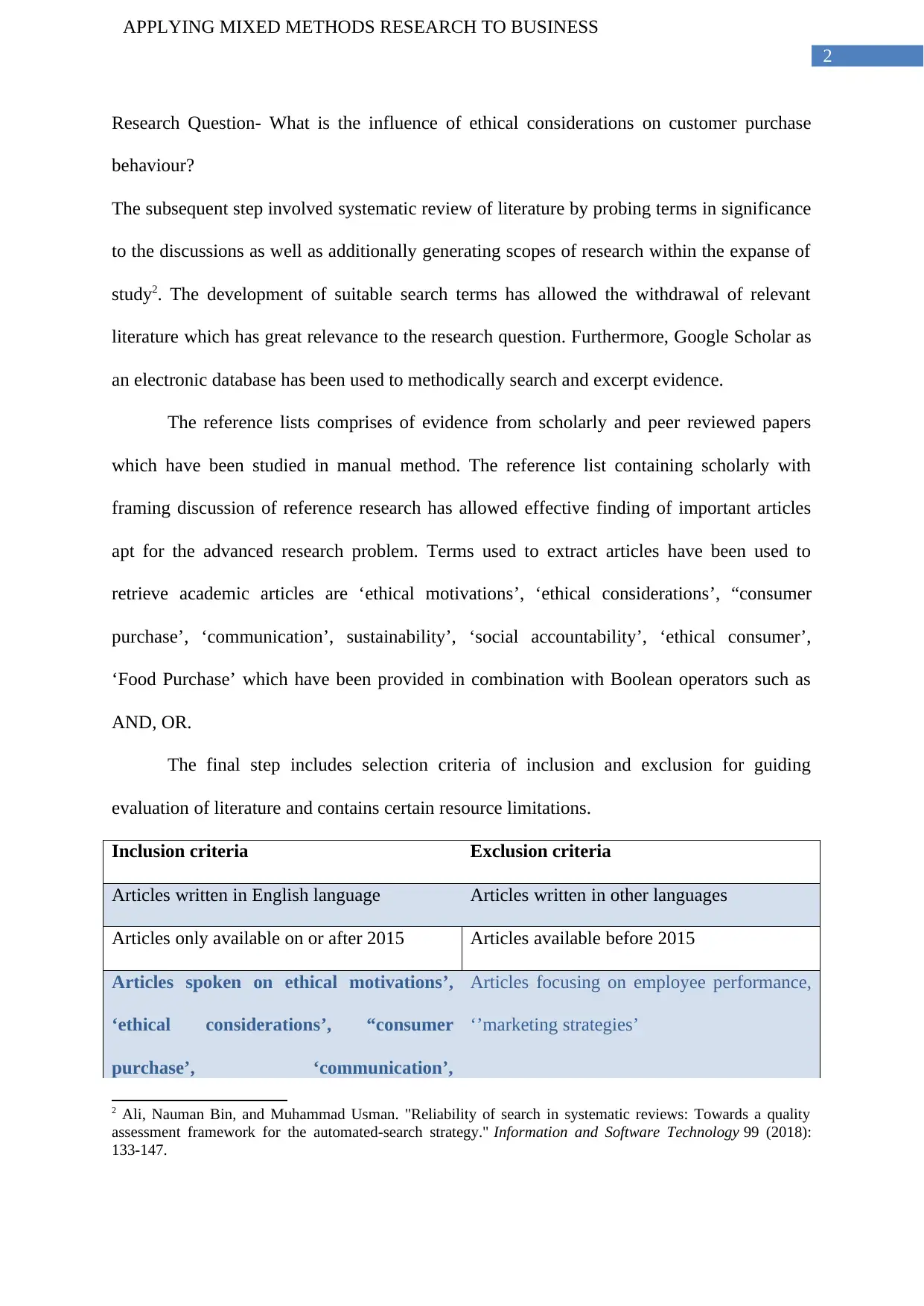
2
APPLYING MIXED METHODS RESEARCH TO BUSINESS
Research Question- What is the influence of ethical considerations on customer purchase
behaviour?
The subsequent step involved systematic review of literature by probing terms in significance
to the discussions as well as additionally generating scopes of research within the expanse of
study2. The development of suitable search terms has allowed the withdrawal of relevant
literature which has great relevance to the research question. Furthermore, Google Scholar as
an electronic database has been used to methodically search and excerpt evidence.
The reference lists comprises of evidence from scholarly and peer reviewed papers
which have been studied in manual method. The reference list containing scholarly with
framing discussion of reference research has allowed effective finding of important articles
apt for the advanced research problem. Terms used to extract articles have been used to
retrieve academic articles are ‘ethical motivations’, ‘ethical considerations’, “consumer
purchase’, ‘communication’, sustainability’, ‘social accountability’, ‘ethical consumer’,
‘Food Purchase’ which have been provided in combination with Boolean operators such as
AND, OR.
The final step includes selection criteria of inclusion and exclusion for guiding
evaluation of literature and contains certain resource limitations.
Inclusion criteria Exclusion criteria
Articles written in English language Articles written in other languages
Articles only available on or after 2015 Articles available before 2015
Articles spoken on ethical motivations’,
‘ethical considerations’, “consumer
purchase’, ‘communication’,
Articles focusing on employee performance,
‘’marketing strategies’
2 Ali, Nauman Bin, and Muhammad Usman. "Reliability of search in systematic reviews: Towards a quality
assessment framework for the automated-search strategy." Information and Software Technology 99 (2018):
133-147.
APPLYING MIXED METHODS RESEARCH TO BUSINESS
Research Question- What is the influence of ethical considerations on customer purchase
behaviour?
The subsequent step involved systematic review of literature by probing terms in significance
to the discussions as well as additionally generating scopes of research within the expanse of
study2. The development of suitable search terms has allowed the withdrawal of relevant
literature which has great relevance to the research question. Furthermore, Google Scholar as
an electronic database has been used to methodically search and excerpt evidence.
The reference lists comprises of evidence from scholarly and peer reviewed papers
which have been studied in manual method. The reference list containing scholarly with
framing discussion of reference research has allowed effective finding of important articles
apt for the advanced research problem. Terms used to extract articles have been used to
retrieve academic articles are ‘ethical motivations’, ‘ethical considerations’, “consumer
purchase’, ‘communication’, sustainability’, ‘social accountability’, ‘ethical consumer’,
‘Food Purchase’ which have been provided in combination with Boolean operators such as
AND, OR.
The final step includes selection criteria of inclusion and exclusion for guiding
evaluation of literature and contains certain resource limitations.
Inclusion criteria Exclusion criteria
Articles written in English language Articles written in other languages
Articles only available on or after 2015 Articles available before 2015
Articles spoken on ethical motivations’,
‘ethical considerations’, “consumer
purchase’, ‘communication’,
Articles focusing on employee performance,
‘’marketing strategies’
2 Ali, Nauman Bin, and Muhammad Usman. "Reliability of search in systematic reviews: Towards a quality
assessment framework for the automated-search strategy." Information and Software Technology 99 (2018):
133-147.
⊘ This is a preview!⊘
Do you want full access?
Subscribe today to unlock all pages.

Trusted by 1+ million students worldwide
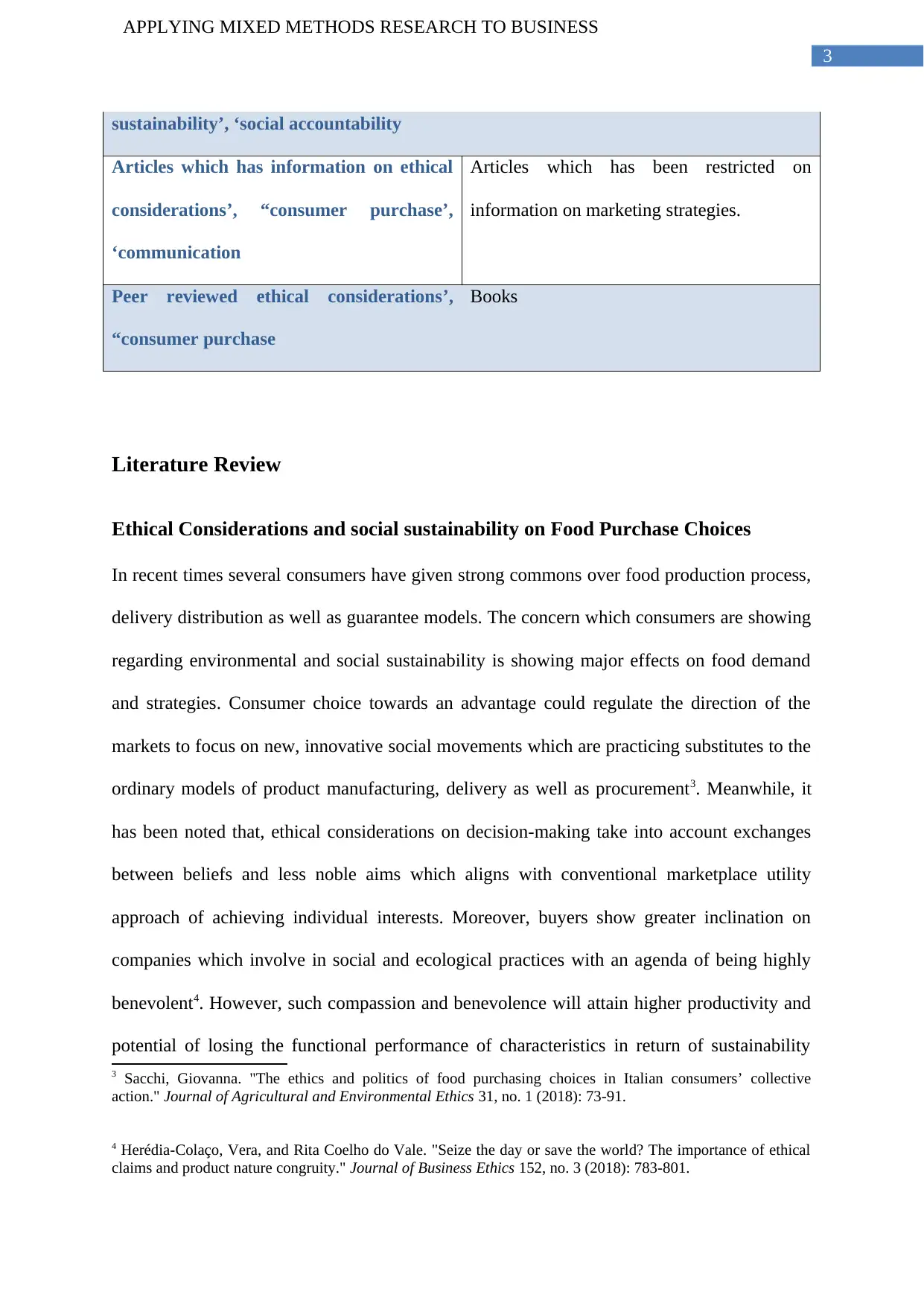
3
APPLYING MIXED METHODS RESEARCH TO BUSINESS
sustainability’, ‘social accountability
Articles which has information on ethical
considerations’, “consumer purchase’,
‘communication
Articles which has been restricted on
information on marketing strategies.
Peer reviewed ethical considerations’,
“consumer purchase
Books
Literature Review
Ethical Considerations and social sustainability on Food Purchase Choices
In recent times several consumers have given strong commons over food production process,
delivery distribution as well as guarantee models. The concern which consumers are showing
regarding environmental and social sustainability is showing major effects on food demand
and strategies. Consumer choice towards an advantage could regulate the direction of the
markets to focus on new, innovative social movements which are practicing substitutes to the
ordinary models of product manufacturing, delivery as well as procurement3. Meanwhile, it
has been noted that, ethical considerations on decision-making take into account exchanges
between beliefs and less noble aims which aligns with conventional marketplace utility
approach of achieving individual interests. Moreover, buyers show greater inclination on
companies which involve in social and ecological practices with an agenda of being highly
benevolent4. However, such compassion and benevolence will attain higher productivity and
potential of losing the functional performance of characteristics in return of sustainability
3 Sacchi, Giovanna. "The ethics and politics of food purchasing choices in Italian consumers’ collective
action." Journal of Agricultural and Environmental Ethics 31, no. 1 (2018): 73-91.
4 Herédia-Colaço, Vera, and Rita Coelho do Vale. "Seize the day or save the world? The importance of ethical
claims and product nature congruity." Journal of Business Ethics 152, no. 3 (2018): 783-801.
APPLYING MIXED METHODS RESEARCH TO BUSINESS
sustainability’, ‘social accountability
Articles which has information on ethical
considerations’, “consumer purchase’,
‘communication
Articles which has been restricted on
information on marketing strategies.
Peer reviewed ethical considerations’,
“consumer purchase
Books
Literature Review
Ethical Considerations and social sustainability on Food Purchase Choices
In recent times several consumers have given strong commons over food production process,
delivery distribution as well as guarantee models. The concern which consumers are showing
regarding environmental and social sustainability is showing major effects on food demand
and strategies. Consumer choice towards an advantage could regulate the direction of the
markets to focus on new, innovative social movements which are practicing substitutes to the
ordinary models of product manufacturing, delivery as well as procurement3. Meanwhile, it
has been noted that, ethical considerations on decision-making take into account exchanges
between beliefs and less noble aims which aligns with conventional marketplace utility
approach of achieving individual interests. Moreover, buyers show greater inclination on
companies which involve in social and ecological practices with an agenda of being highly
benevolent4. However, such compassion and benevolence will attain higher productivity and
potential of losing the functional performance of characteristics in return of sustainability
3 Sacchi, Giovanna. "The ethics and politics of food purchasing choices in Italian consumers’ collective
action." Journal of Agricultural and Environmental Ethics 31, no. 1 (2018): 73-91.
4 Herédia-Colaço, Vera, and Rita Coelho do Vale. "Seize the day or save the world? The importance of ethical
claims and product nature congruity." Journal of Business Ethics 152, no. 3 (2018): 783-801.
Paraphrase This Document
Need a fresh take? Get an instant paraphrase of this document with our AI Paraphraser
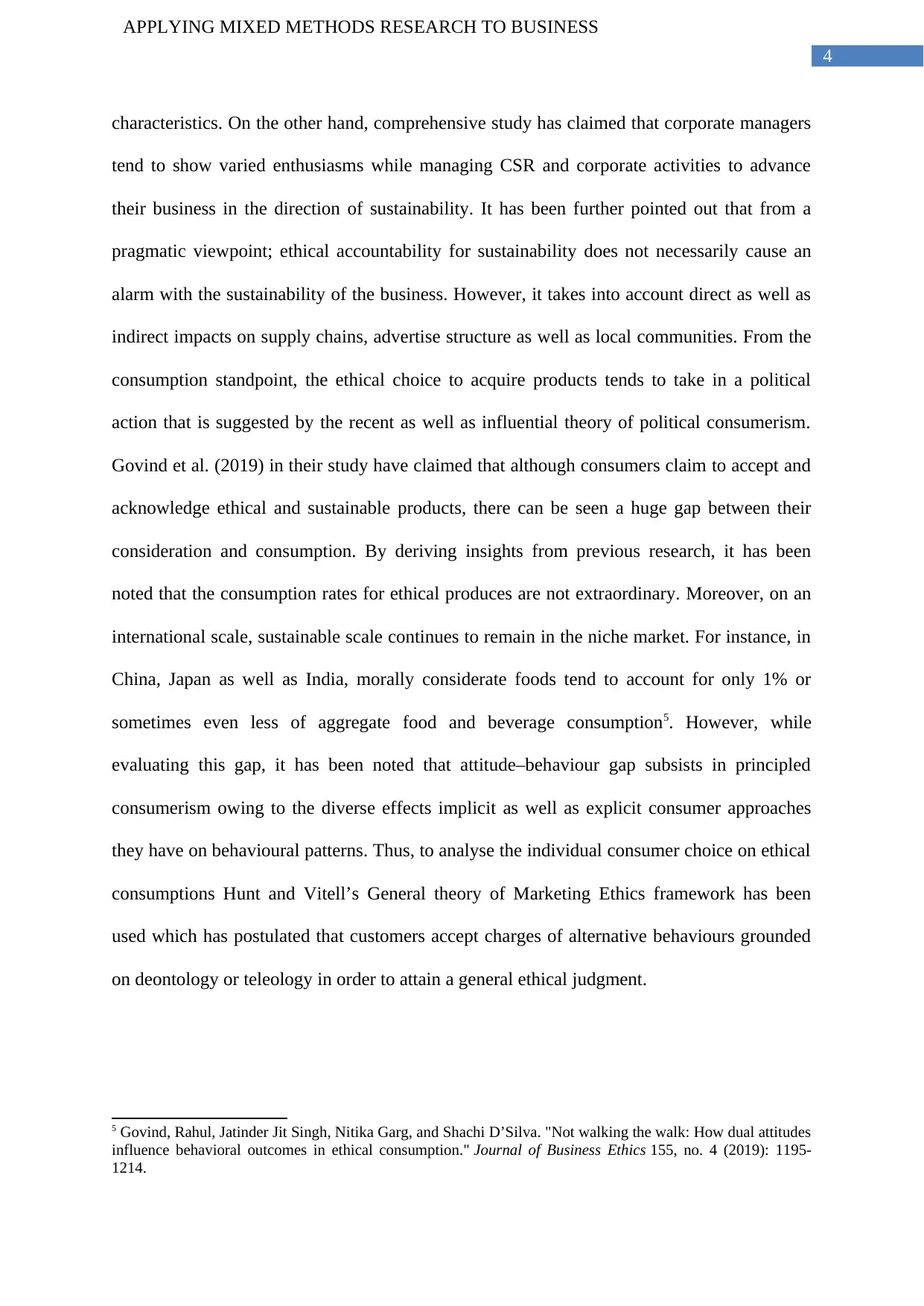
4
APPLYING MIXED METHODS RESEARCH TO BUSINESS
characteristics. On the other hand, comprehensive study has claimed that corporate managers
tend to show varied enthusiasms while managing CSR and corporate activities to advance
their business in the direction of sustainability. It has been further pointed out that from a
pragmatic viewpoint; ethical accountability for sustainability does not necessarily cause an
alarm with the sustainability of the business. However, it takes into account direct as well as
indirect impacts on supply chains, advertise structure as well as local communities. From the
consumption standpoint, the ethical choice to acquire products tends to take in a political
action that is suggested by the recent as well as influential theory of political consumerism.
Govind et al. (2019) in their study have claimed that although consumers claim to accept and
acknowledge ethical and sustainable products, there can be seen a huge gap between their
consideration and consumption. By deriving insights from previous research, it has been
noted that the consumption rates for ethical produces are not extraordinary. Moreover, on an
international scale, sustainable scale continues to remain in the niche market. For instance, in
China, Japan as well as India, morally considerate foods tend to account for only 1% or
sometimes even less of aggregate food and beverage consumption5. However, while
evaluating this gap, it has been noted that attitude–behaviour gap subsists in principled
consumerism owing to the diverse effects implicit as well as explicit consumer approaches
they have on behavioural patterns. Thus, to analyse the individual consumer choice on ethical
consumptions Hunt and Vitell’s General theory of Marketing Ethics framework has been
used which has postulated that customers accept charges of alternative behaviours grounded
on deontology or teleology in order to attain a general ethical judgment.
5 Govind, Rahul, Jatinder Jit Singh, Nitika Garg, and Shachi D’Silva. "Not walking the walk: How dual attitudes
influence behavioral outcomes in ethical consumption." Journal of Business Ethics 155, no. 4 (2019): 1195-
1214.
APPLYING MIXED METHODS RESEARCH TO BUSINESS
characteristics. On the other hand, comprehensive study has claimed that corporate managers
tend to show varied enthusiasms while managing CSR and corporate activities to advance
their business in the direction of sustainability. It has been further pointed out that from a
pragmatic viewpoint; ethical accountability for sustainability does not necessarily cause an
alarm with the sustainability of the business. However, it takes into account direct as well as
indirect impacts on supply chains, advertise structure as well as local communities. From the
consumption standpoint, the ethical choice to acquire products tends to take in a political
action that is suggested by the recent as well as influential theory of political consumerism.
Govind et al. (2019) in their study have claimed that although consumers claim to accept and
acknowledge ethical and sustainable products, there can be seen a huge gap between their
consideration and consumption. By deriving insights from previous research, it has been
noted that the consumption rates for ethical produces are not extraordinary. Moreover, on an
international scale, sustainable scale continues to remain in the niche market. For instance, in
China, Japan as well as India, morally considerate foods tend to account for only 1% or
sometimes even less of aggregate food and beverage consumption5. However, while
evaluating this gap, it has been noted that attitude–behaviour gap subsists in principled
consumerism owing to the diverse effects implicit as well as explicit consumer approaches
they have on behavioural patterns. Thus, to analyse the individual consumer choice on ethical
consumptions Hunt and Vitell’s General theory of Marketing Ethics framework has been
used which has postulated that customers accept charges of alternative behaviours grounded
on deontology or teleology in order to attain a general ethical judgment.
5 Govind, Rahul, Jatinder Jit Singh, Nitika Garg, and Shachi D’Silva. "Not walking the walk: How dual attitudes
influence behavioral outcomes in ethical consumption." Journal of Business Ethics 155, no. 4 (2019): 1195-
1214.
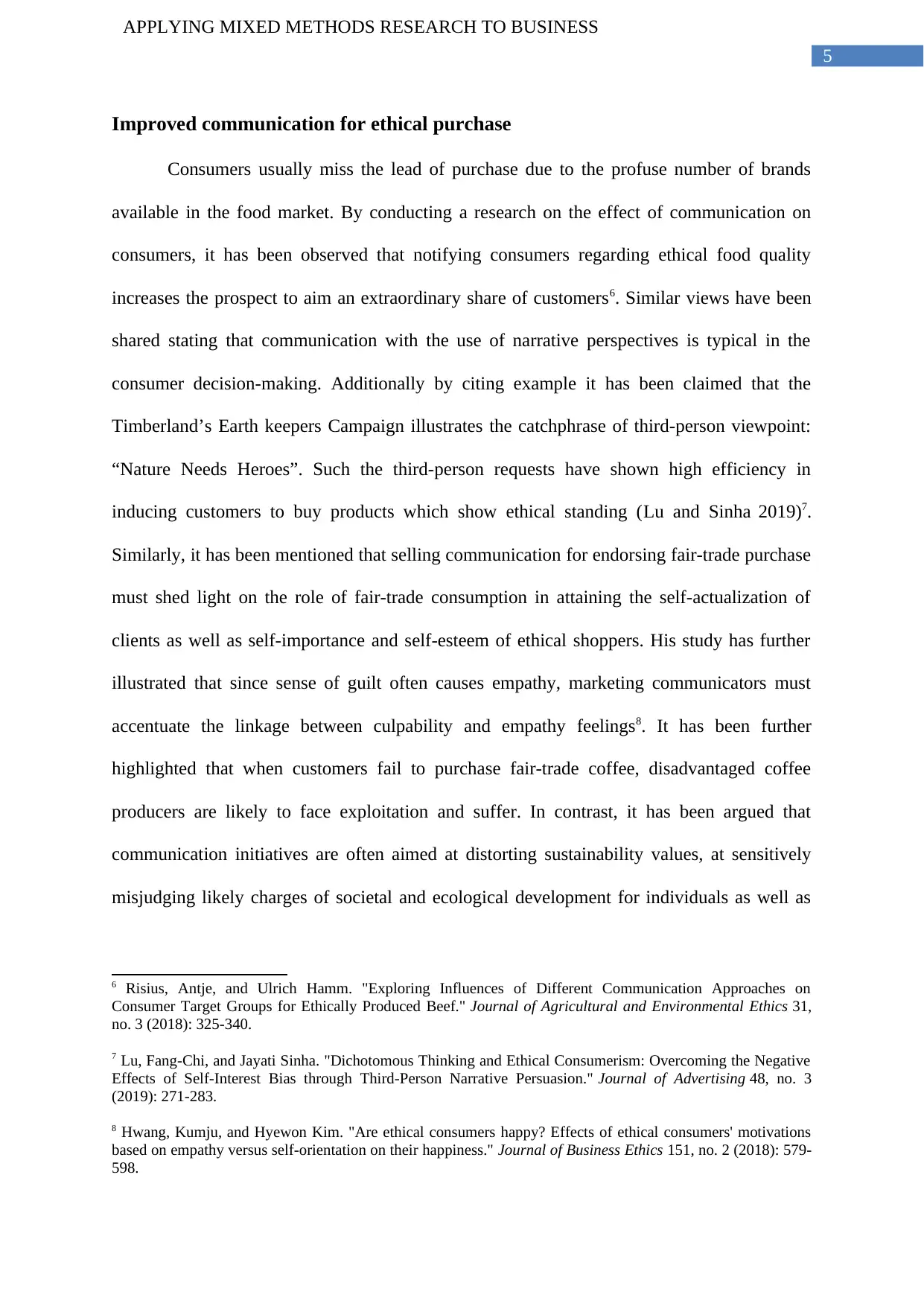
5
APPLYING MIXED METHODS RESEARCH TO BUSINESS
Improved communication for ethical purchase
Consumers usually miss the lead of purchase due to the profuse number of brands
available in the food market. By conducting a research on the effect of communication on
consumers, it has been observed that notifying consumers regarding ethical food quality
increases the prospect to aim an extraordinary share of customers6. Similar views have been
shared stating that communication with the use of narrative perspectives is typical in the
consumer decision-making. Additionally by citing example it has been claimed that the
Timberland’s Earth keepers Campaign illustrates the catchphrase of third-person viewpoint:
“Nature Needs Heroes”. Such the third-person requests have shown high efficiency in
inducing customers to buy products which show ethical standing (Lu and Sinha 2019)7.
Similarly, it has been mentioned that selling communication for endorsing fair-trade purchase
must shed light on the role of fair-trade consumption in attaining the self-actualization of
clients as well as self-importance and self-esteem of ethical shoppers. His study has further
illustrated that since sense of guilt often causes empathy, marketing communicators must
accentuate the linkage between culpability and empathy feelings8. It has been further
highlighted that when customers fail to purchase fair-trade coffee, disadvantaged coffee
producers are likely to face exploitation and suffer. In contrast, it has been argued that
communication initiatives are often aimed at distorting sustainability values, at sensitively
misjudging likely charges of societal and ecological development for individuals as well as
6 Risius, Antje, and Ulrich Hamm. "Exploring Influences of Different Communication Approaches on
Consumer Target Groups for Ethically Produced Beef." Journal of Agricultural and Environmental Ethics 31,
no. 3 (2018): 325-340.
7 Lu, Fang-Chi, and Jayati Sinha. "Dichotomous Thinking and Ethical Consumerism: Overcoming the Negative
Effects of Self-Interest Bias through Third-Person Narrative Persuasion." Journal of Advertising 48, no. 3
(2019): 271-283.
8 Hwang, Kumju, and Hyewon Kim. "Are ethical consumers happy? Effects of ethical consumers' motivations
based on empathy versus self-orientation on their happiness." Journal of Business Ethics 151, no. 2 (2018): 579-
598.
APPLYING MIXED METHODS RESEARCH TO BUSINESS
Improved communication for ethical purchase
Consumers usually miss the lead of purchase due to the profuse number of brands
available in the food market. By conducting a research on the effect of communication on
consumers, it has been observed that notifying consumers regarding ethical food quality
increases the prospect to aim an extraordinary share of customers6. Similar views have been
shared stating that communication with the use of narrative perspectives is typical in the
consumer decision-making. Additionally by citing example it has been claimed that the
Timberland’s Earth keepers Campaign illustrates the catchphrase of third-person viewpoint:
“Nature Needs Heroes”. Such the third-person requests have shown high efficiency in
inducing customers to buy products which show ethical standing (Lu and Sinha 2019)7.
Similarly, it has been mentioned that selling communication for endorsing fair-trade purchase
must shed light on the role of fair-trade consumption in attaining the self-actualization of
clients as well as self-importance and self-esteem of ethical shoppers. His study has further
illustrated that since sense of guilt often causes empathy, marketing communicators must
accentuate the linkage between culpability and empathy feelings8. It has been further
highlighted that when customers fail to purchase fair-trade coffee, disadvantaged coffee
producers are likely to face exploitation and suffer. In contrast, it has been argued that
communication initiatives are often aimed at distorting sustainability values, at sensitively
misjudging likely charges of societal and ecological development for individuals as well as
6 Risius, Antje, and Ulrich Hamm. "Exploring Influences of Different Communication Approaches on
Consumer Target Groups for Ethically Produced Beef." Journal of Agricultural and Environmental Ethics 31,
no. 3 (2018): 325-340.
7 Lu, Fang-Chi, and Jayati Sinha. "Dichotomous Thinking and Ethical Consumerism: Overcoming the Negative
Effects of Self-Interest Bias through Third-Person Narrative Persuasion." Journal of Advertising 48, no. 3
(2019): 271-283.
8 Hwang, Kumju, and Hyewon Kim. "Are ethical consumers happy? Effects of ethical consumers' motivations
based on empathy versus self-orientation on their happiness." Journal of Business Ethics 151, no. 2 (2018): 579-
598.
⊘ This is a preview!⊘
Do you want full access?
Subscribe today to unlock all pages.

Trusted by 1+ million students worldwide
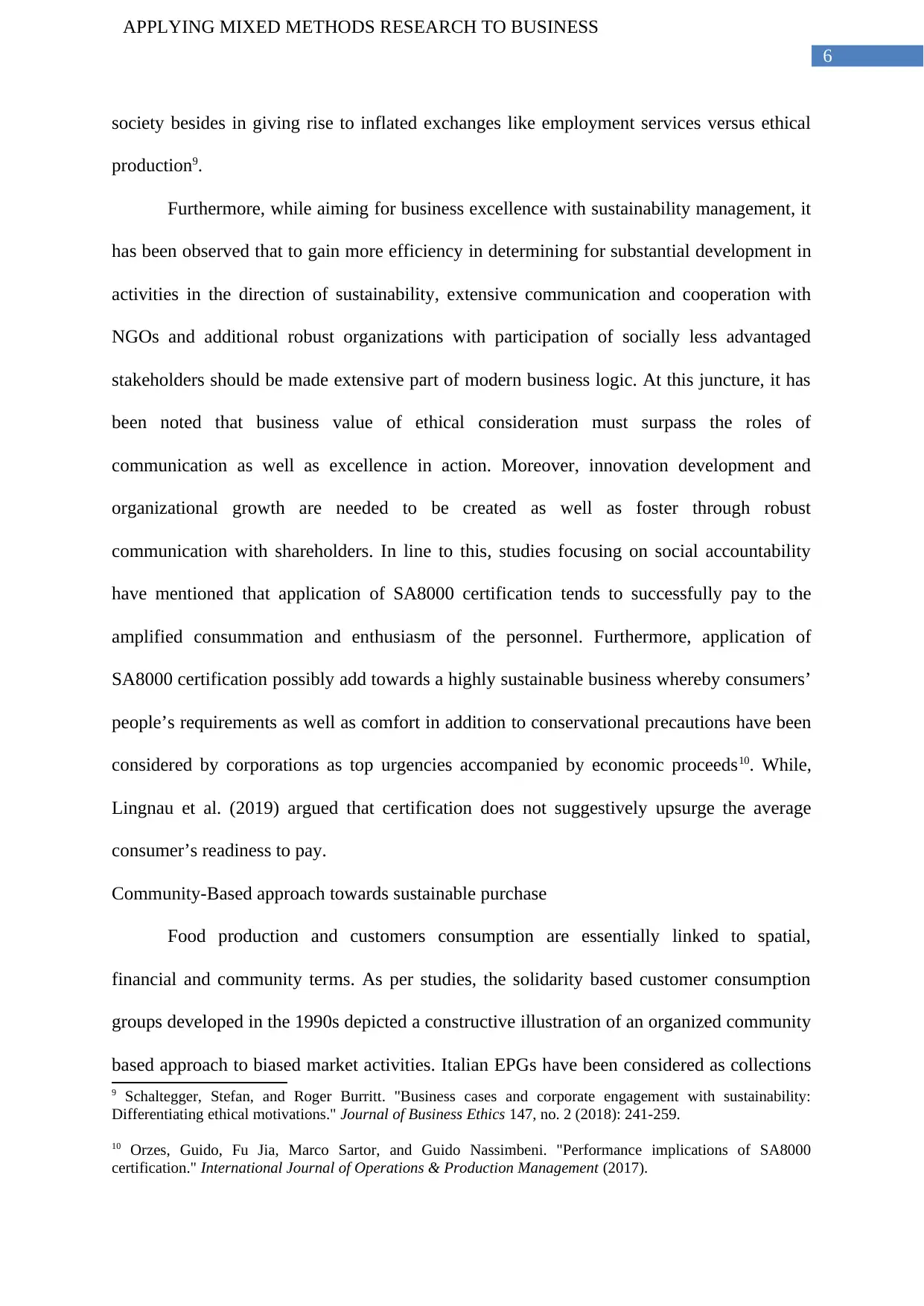
6
APPLYING MIXED METHODS RESEARCH TO BUSINESS
society besides in giving rise to inflated exchanges like employment services versus ethical
production9.
Furthermore, while aiming for business excellence with sustainability management, it
has been observed that to gain more efficiency in determining for substantial development in
activities in the direction of sustainability, extensive communication and cooperation with
NGOs and additional robust organizations with participation of socially less advantaged
stakeholders should be made extensive part of modern business logic. At this juncture, it has
been noted that business value of ethical consideration must surpass the roles of
communication as well as excellence in action. Moreover, innovation development and
organizational growth are needed to be created as well as foster through robust
communication with shareholders. In line to this, studies focusing on social accountability
have mentioned that application of SA8000 certification tends to successfully pay to the
amplified consummation and enthusiasm of the personnel. Furthermore, application of
SA8000 certification possibly add towards a highly sustainable business whereby consumers’
people’s requirements as well as comfort in addition to conservational precautions have been
considered by corporations as top urgencies accompanied by economic proceeds10. While,
Lingnau et al. (2019) argued that certification does not suggestively upsurge the average
consumer’s readiness to pay.
Community-Based approach towards sustainable purchase
Food production and customers consumption are essentially linked to spatial,
financial and community terms. As per studies, the solidarity based customer consumption
groups developed in the 1990s depicted a constructive illustration of an organized community
based approach to biased market activities. Italian EPGs have been considered as collections
9 Schaltegger, Stefan, and Roger Burritt. "Business cases and corporate engagement with sustainability:
Differentiating ethical motivations." Journal of Business Ethics 147, no. 2 (2018): 241-259.
10 Orzes, Guido, Fu Jia, Marco Sartor, and Guido Nassimbeni. "Performance implications of SA8000
certification." International Journal of Operations & Production Management (2017).
APPLYING MIXED METHODS RESEARCH TO BUSINESS
society besides in giving rise to inflated exchanges like employment services versus ethical
production9.
Furthermore, while aiming for business excellence with sustainability management, it
has been observed that to gain more efficiency in determining for substantial development in
activities in the direction of sustainability, extensive communication and cooperation with
NGOs and additional robust organizations with participation of socially less advantaged
stakeholders should be made extensive part of modern business logic. At this juncture, it has
been noted that business value of ethical consideration must surpass the roles of
communication as well as excellence in action. Moreover, innovation development and
organizational growth are needed to be created as well as foster through robust
communication with shareholders. In line to this, studies focusing on social accountability
have mentioned that application of SA8000 certification tends to successfully pay to the
amplified consummation and enthusiasm of the personnel. Furthermore, application of
SA8000 certification possibly add towards a highly sustainable business whereby consumers’
people’s requirements as well as comfort in addition to conservational precautions have been
considered by corporations as top urgencies accompanied by economic proceeds10. While,
Lingnau et al. (2019) argued that certification does not suggestively upsurge the average
consumer’s readiness to pay.
Community-Based approach towards sustainable purchase
Food production and customers consumption are essentially linked to spatial,
financial and community terms. As per studies, the solidarity based customer consumption
groups developed in the 1990s depicted a constructive illustration of an organized community
based approach to biased market activities. Italian EPGs have been considered as collections
9 Schaltegger, Stefan, and Roger Burritt. "Business cases and corporate engagement with sustainability:
Differentiating ethical motivations." Journal of Business Ethics 147, no. 2 (2018): 241-259.
10 Orzes, Guido, Fu Jia, Marco Sartor, and Guido Nassimbeni. "Performance implications of SA8000
certification." International Journal of Operations & Production Management (2017).
Paraphrase This Document
Need a fresh take? Get an instant paraphrase of this document with our AI Paraphraser
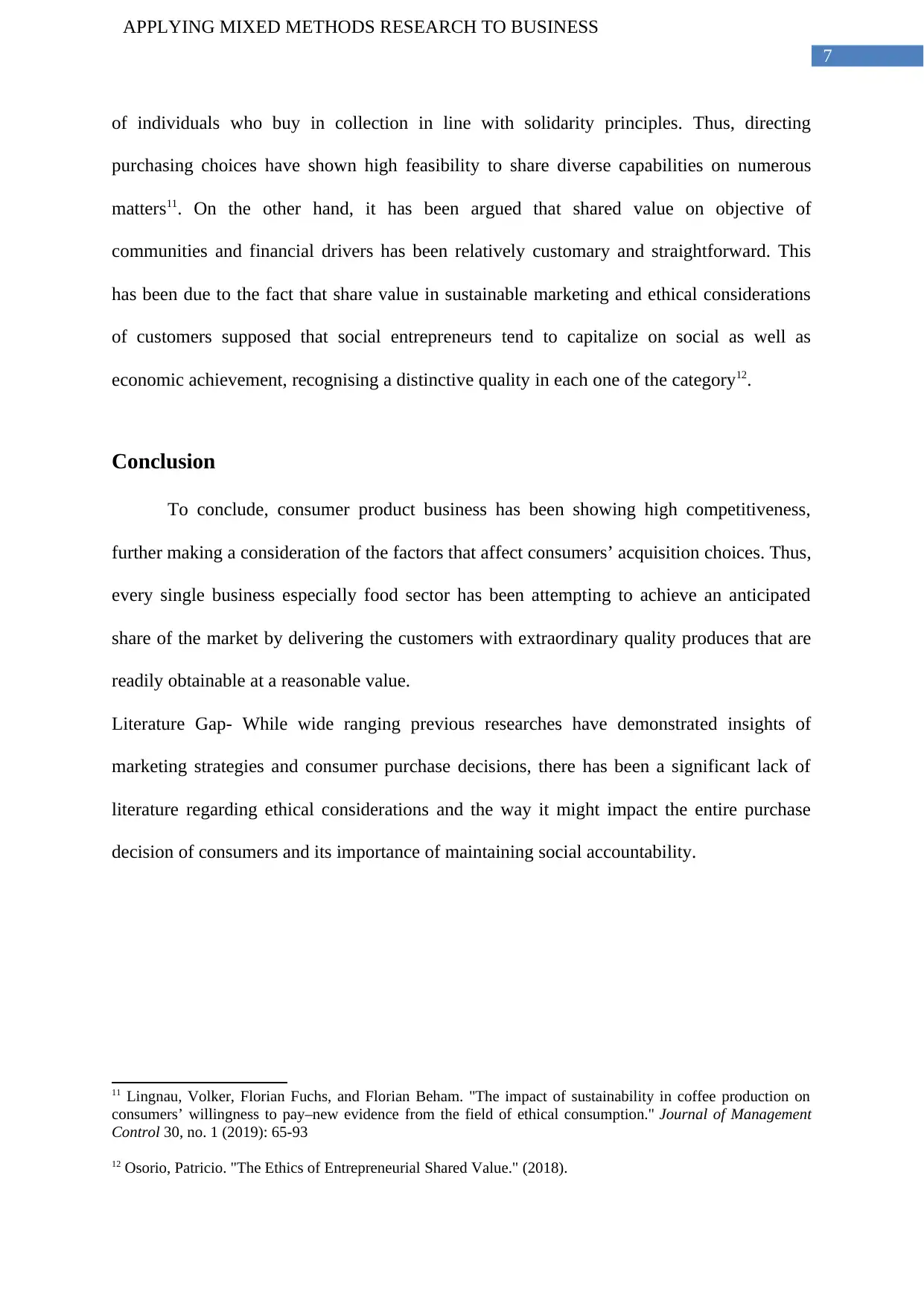
7
APPLYING MIXED METHODS RESEARCH TO BUSINESS
of individuals who buy in collection in line with solidarity principles. Thus, directing
purchasing choices have shown high feasibility to share diverse capabilities on numerous
matters11. On the other hand, it has been argued that shared value on objective of
communities and financial drivers has been relatively customary and straightforward. This
has been due to the fact that share value in sustainable marketing and ethical considerations
of customers supposed that social entrepreneurs tend to capitalize on social as well as
economic achievement, recognising a distinctive quality in each one of the category12.
Conclusion
To conclude, consumer product business has been showing high competitiveness,
further making a consideration of the factors that affect consumers’ acquisition choices. Thus,
every single business especially food sector has been attempting to achieve an anticipated
share of the market by delivering the customers with extraordinary quality produces that are
readily obtainable at a reasonable value.
Literature Gap- While wide ranging previous researches have demonstrated insights of
marketing strategies and consumer purchase decisions, there has been a significant lack of
literature regarding ethical considerations and the way it might impact the entire purchase
decision of consumers and its importance of maintaining social accountability.
11 Lingnau, Volker, Florian Fuchs, and Florian Beham. "The impact of sustainability in coffee production on
consumers’ willingness to pay–new evidence from the field of ethical consumption." Journal of Management
Control 30, no. 1 (2019): 65-93
12 Osorio, Patricio. "The Ethics of Entrepreneurial Shared Value." (2018).
APPLYING MIXED METHODS RESEARCH TO BUSINESS
of individuals who buy in collection in line with solidarity principles. Thus, directing
purchasing choices have shown high feasibility to share diverse capabilities on numerous
matters11. On the other hand, it has been argued that shared value on objective of
communities and financial drivers has been relatively customary and straightforward. This
has been due to the fact that share value in sustainable marketing and ethical considerations
of customers supposed that social entrepreneurs tend to capitalize on social as well as
economic achievement, recognising a distinctive quality in each one of the category12.
Conclusion
To conclude, consumer product business has been showing high competitiveness,
further making a consideration of the factors that affect consumers’ acquisition choices. Thus,
every single business especially food sector has been attempting to achieve an anticipated
share of the market by delivering the customers with extraordinary quality produces that are
readily obtainable at a reasonable value.
Literature Gap- While wide ranging previous researches have demonstrated insights of
marketing strategies and consumer purchase decisions, there has been a significant lack of
literature regarding ethical considerations and the way it might impact the entire purchase
decision of consumers and its importance of maintaining social accountability.
11 Lingnau, Volker, Florian Fuchs, and Florian Beham. "The impact of sustainability in coffee production on
consumers’ willingness to pay–new evidence from the field of ethical consumption." Journal of Management
Control 30, no. 1 (2019): 65-93
12 Osorio, Patricio. "The Ethics of Entrepreneurial Shared Value." (2018).
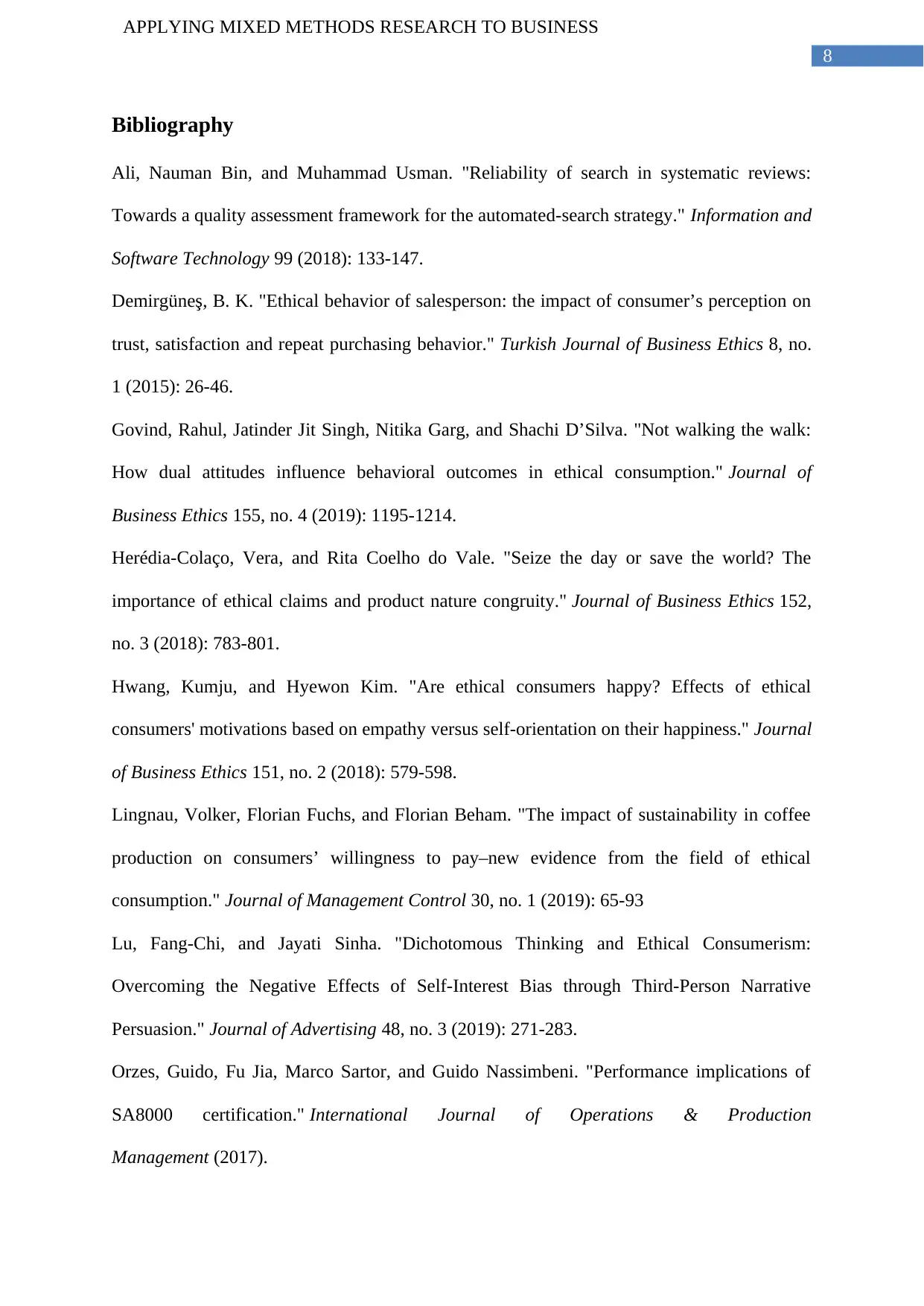
8
APPLYING MIXED METHODS RESEARCH TO BUSINESS
Bibliography
Ali, Nauman Bin, and Muhammad Usman. "Reliability of search in systematic reviews:
Towards a quality assessment framework for the automated-search strategy." Information and
Software Technology 99 (2018): 133-147.
Demirgüneş, B. K. "Ethical behavior of salesperson: the impact of consumer’s perception on
trust, satisfaction and repeat purchasing behavior." Turkish Journal of Business Ethics 8, no.
1 (2015): 26-46.
Govind, Rahul, Jatinder Jit Singh, Nitika Garg, and Shachi D’Silva. "Not walking the walk:
How dual attitudes influence behavioral outcomes in ethical consumption." Journal of
Business Ethics 155, no. 4 (2019): 1195-1214.
Herédia-Colaço, Vera, and Rita Coelho do Vale. "Seize the day or save the world? The
importance of ethical claims and product nature congruity." Journal of Business Ethics 152,
no. 3 (2018): 783-801.
Hwang, Kumju, and Hyewon Kim. "Are ethical consumers happy? Effects of ethical
consumers' motivations based on empathy versus self-orientation on their happiness." Journal
of Business Ethics 151, no. 2 (2018): 579-598.
Lingnau, Volker, Florian Fuchs, and Florian Beham. "The impact of sustainability in coffee
production on consumers’ willingness to pay–new evidence from the field of ethical
consumption." Journal of Management Control 30, no. 1 (2019): 65-93
Lu, Fang-Chi, and Jayati Sinha. "Dichotomous Thinking and Ethical Consumerism:
Overcoming the Negative Effects of Self-Interest Bias through Third-Person Narrative
Persuasion." Journal of Advertising 48, no. 3 (2019): 271-283.
Orzes, Guido, Fu Jia, Marco Sartor, and Guido Nassimbeni. "Performance implications of
SA8000 certification." International Journal of Operations & Production
Management (2017).
APPLYING MIXED METHODS RESEARCH TO BUSINESS
Bibliography
Ali, Nauman Bin, and Muhammad Usman. "Reliability of search in systematic reviews:
Towards a quality assessment framework for the automated-search strategy." Information and
Software Technology 99 (2018): 133-147.
Demirgüneş, B. K. "Ethical behavior of salesperson: the impact of consumer’s perception on
trust, satisfaction and repeat purchasing behavior." Turkish Journal of Business Ethics 8, no.
1 (2015): 26-46.
Govind, Rahul, Jatinder Jit Singh, Nitika Garg, and Shachi D’Silva. "Not walking the walk:
How dual attitudes influence behavioral outcomes in ethical consumption." Journal of
Business Ethics 155, no. 4 (2019): 1195-1214.
Herédia-Colaço, Vera, and Rita Coelho do Vale. "Seize the day or save the world? The
importance of ethical claims and product nature congruity." Journal of Business Ethics 152,
no. 3 (2018): 783-801.
Hwang, Kumju, and Hyewon Kim. "Are ethical consumers happy? Effects of ethical
consumers' motivations based on empathy versus self-orientation on their happiness." Journal
of Business Ethics 151, no. 2 (2018): 579-598.
Lingnau, Volker, Florian Fuchs, and Florian Beham. "The impact of sustainability in coffee
production on consumers’ willingness to pay–new evidence from the field of ethical
consumption." Journal of Management Control 30, no. 1 (2019): 65-93
Lu, Fang-Chi, and Jayati Sinha. "Dichotomous Thinking and Ethical Consumerism:
Overcoming the Negative Effects of Self-Interest Bias through Third-Person Narrative
Persuasion." Journal of Advertising 48, no. 3 (2019): 271-283.
Orzes, Guido, Fu Jia, Marco Sartor, and Guido Nassimbeni. "Performance implications of
SA8000 certification." International Journal of Operations & Production
Management (2017).
⊘ This is a preview!⊘
Do you want full access?
Subscribe today to unlock all pages.

Trusted by 1+ million students worldwide
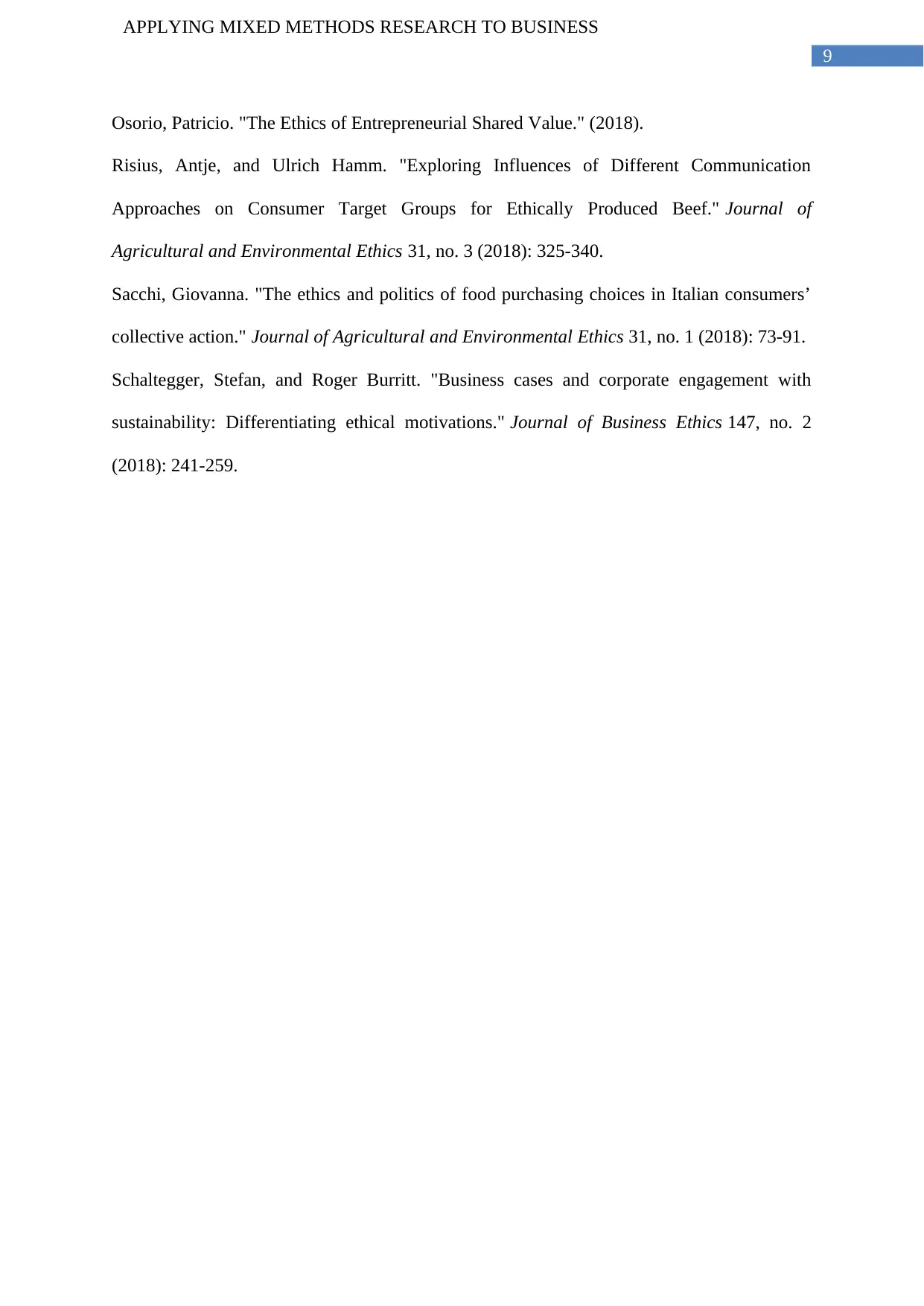
9
APPLYING MIXED METHODS RESEARCH TO BUSINESS
Osorio, Patricio. "The Ethics of Entrepreneurial Shared Value." (2018).
Risius, Antje, and Ulrich Hamm. "Exploring Influences of Different Communication
Approaches on Consumer Target Groups for Ethically Produced Beef." Journal of
Agricultural and Environmental Ethics 31, no. 3 (2018): 325-340.
Sacchi, Giovanna. "The ethics and politics of food purchasing choices in Italian consumers’
collective action." Journal of Agricultural and Environmental Ethics 31, no. 1 (2018): 73-91.
Schaltegger, Stefan, and Roger Burritt. "Business cases and corporate engagement with
sustainability: Differentiating ethical motivations." Journal of Business Ethics 147, no. 2
(2018): 241-259.
APPLYING MIXED METHODS RESEARCH TO BUSINESS
Osorio, Patricio. "The Ethics of Entrepreneurial Shared Value." (2018).
Risius, Antje, and Ulrich Hamm. "Exploring Influences of Different Communication
Approaches on Consumer Target Groups for Ethically Produced Beef." Journal of
Agricultural and Environmental Ethics 31, no. 3 (2018): 325-340.
Sacchi, Giovanna. "The ethics and politics of food purchasing choices in Italian consumers’
collective action." Journal of Agricultural and Environmental Ethics 31, no. 1 (2018): 73-91.
Schaltegger, Stefan, and Roger Burritt. "Business cases and corporate engagement with
sustainability: Differentiating ethical motivations." Journal of Business Ethics 147, no. 2
(2018): 241-259.
Paraphrase This Document
Need a fresh take? Get an instant paraphrase of this document with our AI Paraphraser
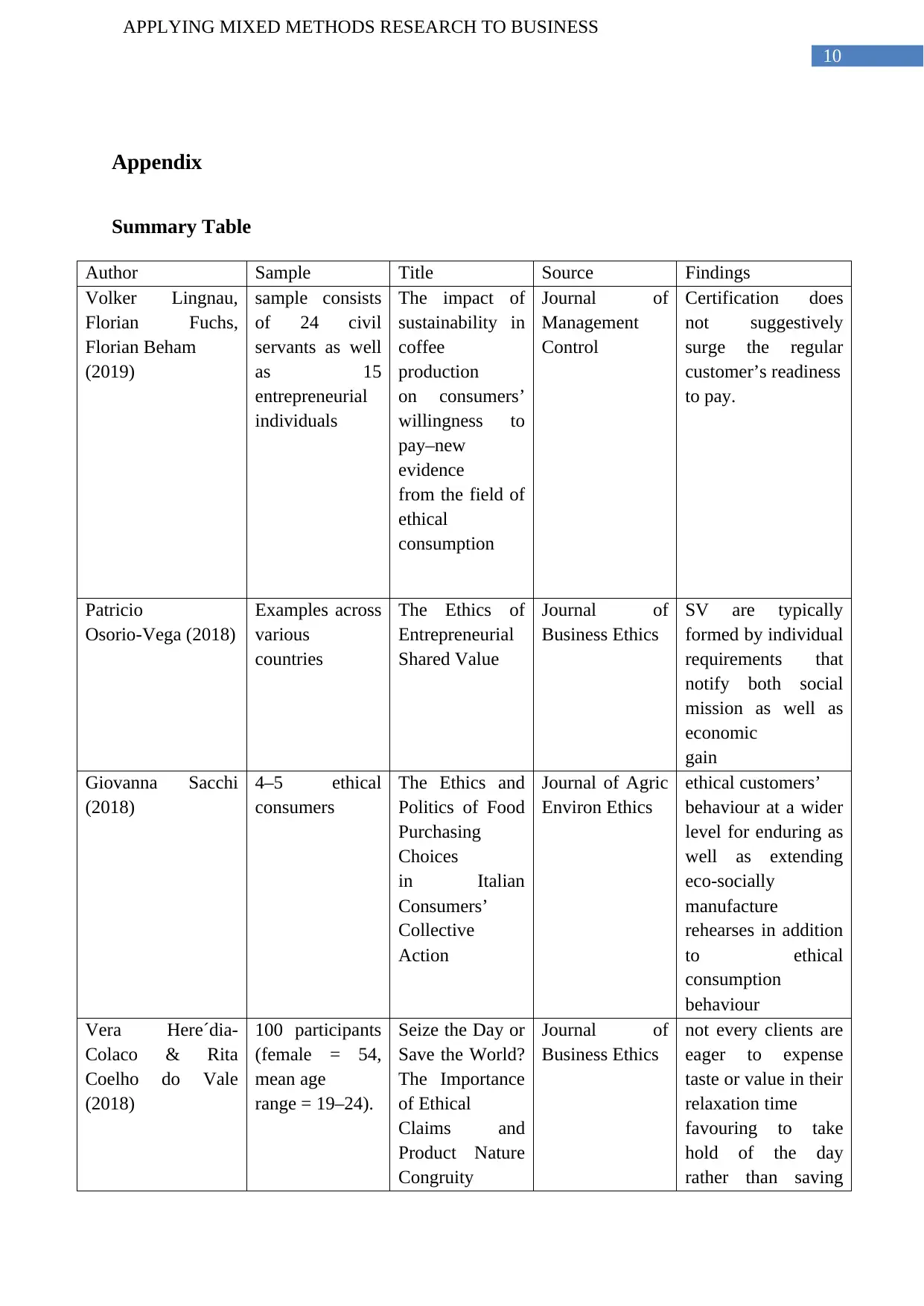
10
APPLYING MIXED METHODS RESEARCH TO BUSINESS
Appendix
Summary Table
Author Sample Title Source Findings
Volker Lingnau,
Florian Fuchs,
Florian Beham
(2019)
sample consists
of 24 civil
servants as well
as 15
entrepreneurial
individuals
The impact of
sustainability in
coffee
production
on consumers’
willingness to
pay–new
evidence
from the field of
ethical
consumption
Journal of
Management
Control
Certification does
not suggestively
surge the regular
customer’s readiness
to pay.
Patricio
Osorio-Vega (2018)
Examples across
various
countries
The Ethics of
Entrepreneurial
Shared Value
Journal of
Business Ethics
SV are typically
formed by individual
requirements that
notify both social
mission as well as
economic
gain
Giovanna Sacchi
(2018)
4–5 ethical
consumers
The Ethics and
Politics of Food
Purchasing
Choices
in Italian
Consumers’
Collective
Action
Journal of Agric
Environ Ethics
ethical customers’
behaviour at a wider
level for enduring as
well as extending
eco-socially
manufacture
rehearses in addition
to ethical
consumption
behaviour
Vera Here´dia-
Colaco & Rita
Coelho do Vale
(2018)
100 participants
(female = 54,
mean age
range = 19–24).
Seize the Day or
Save the World?
The Importance
of Ethical
Claims and
Product Nature
Congruity
Journal of
Business Ethics
not every clients are
eager to expense
taste or value in their
relaxation time
favouring to take
hold of the day
rather than saving
APPLYING MIXED METHODS RESEARCH TO BUSINESS
Appendix
Summary Table
Author Sample Title Source Findings
Volker Lingnau,
Florian Fuchs,
Florian Beham
(2019)
sample consists
of 24 civil
servants as well
as 15
entrepreneurial
individuals
The impact of
sustainability in
coffee
production
on consumers’
willingness to
pay–new
evidence
from the field of
ethical
consumption
Journal of
Management
Control
Certification does
not suggestively
surge the regular
customer’s readiness
to pay.
Patricio
Osorio-Vega (2018)
Examples across
various
countries
The Ethics of
Entrepreneurial
Shared Value
Journal of
Business Ethics
SV are typically
formed by individual
requirements that
notify both social
mission as well as
economic
gain
Giovanna Sacchi
(2018)
4–5 ethical
consumers
The Ethics and
Politics of Food
Purchasing
Choices
in Italian
Consumers’
Collective
Action
Journal of Agric
Environ Ethics
ethical customers’
behaviour at a wider
level for enduring as
well as extending
eco-socially
manufacture
rehearses in addition
to ethical
consumption
behaviour
Vera Here´dia-
Colaco & Rita
Coelho do Vale
(2018)
100 participants
(female = 54,
mean age
range = 19–24).
Seize the Day or
Save the World?
The Importance
of Ethical
Claims and
Product Nature
Congruity
Journal of
Business Ethics
not every clients are
eager to expense
taste or value in their
relaxation time
favouring to take
hold of the day
rather than saving
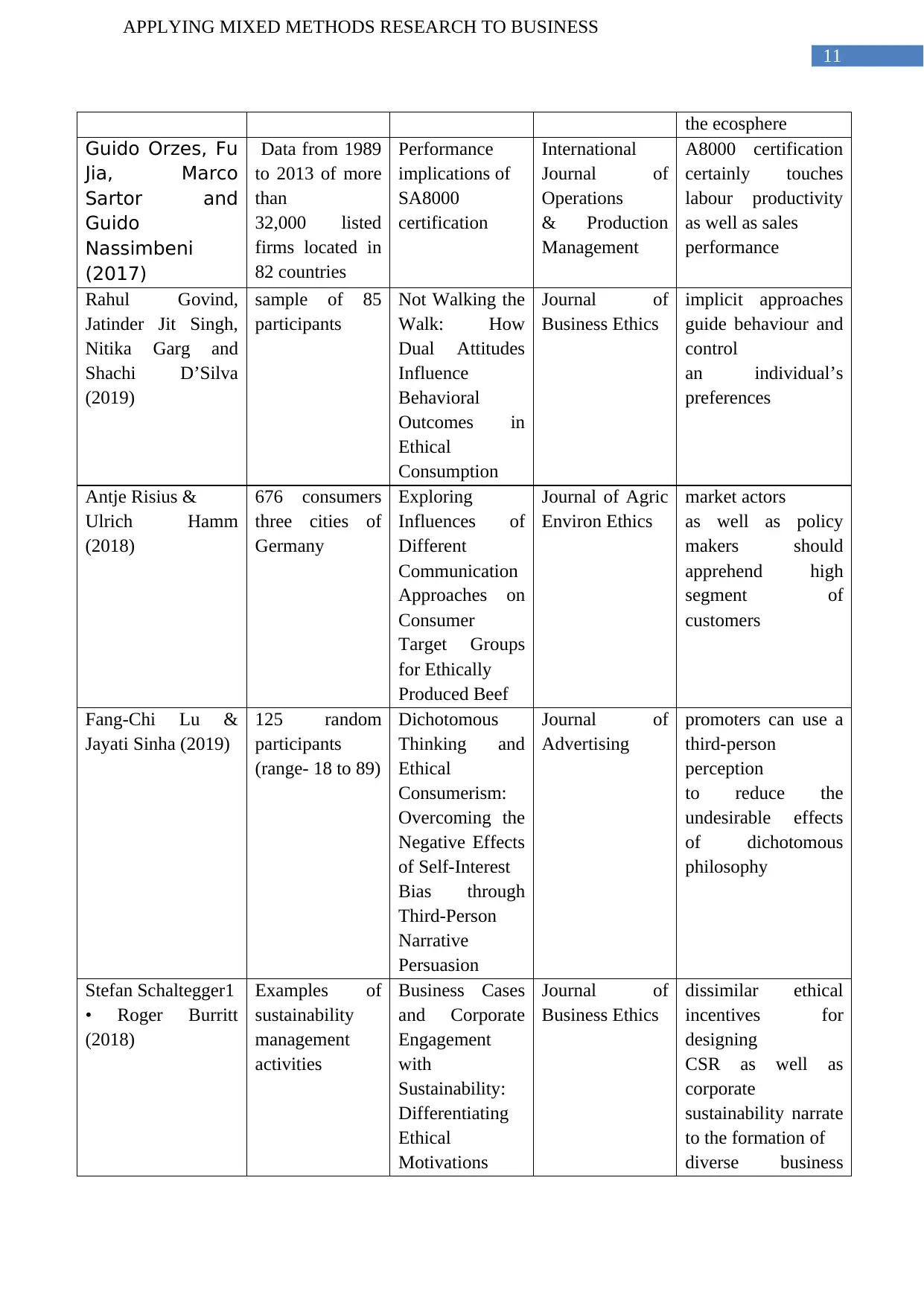
11
APPLYING MIXED METHODS RESEARCH TO BUSINESS
the ecosphere
Guido Orzes, Fu
Jia, Marco
Sartor and
Guido
Nassimbeni
(2017)
Data from 1989
to 2013 of more
than
32,000 listed
firms located in
82 countries
Performance
implications of
SA8000
certification
International
Journal of
Operations
& Production
Management
A8000 certification
certainly touches
labour productivity
as well as sales
performance
Rahul Govind,
Jatinder Jit Singh,
Nitika Garg and
Shachi D’Silva
(2019)
sample of 85
participants
Not Walking the
Walk: How
Dual Attitudes
Influence
Behavioral
Outcomes in
Ethical
Consumption
Journal of
Business Ethics
implicit approaches
guide behaviour and
control
an individual’s
preferences
Antje Risius &
Ulrich Hamm
(2018)
676 consumers
three cities of
Germany
Exploring
Influences of
Different
Communication
Approaches on
Consumer
Target Groups
for Ethically
Produced Beef
Journal of Agric
Environ Ethics
market actors
as well as policy
makers should
apprehend high
segment of
customers
Fang-Chi Lu &
Jayati Sinha (2019)
125 random
participants
(range- 18 to 89)
Dichotomous
Thinking and
Ethical
Consumerism:
Overcoming the
Negative Effects
of Self-Interest
Bias through
Third-Person
Narrative
Persuasion
Journal of
Advertising
promoters can use a
third-person
perception
to reduce the
undesirable effects
of dichotomous
philosophy
Stefan Schaltegger1
• Roger Burritt
(2018)
Examples of
sustainability
management
activities
Business Cases
and Corporate
Engagement
with
Sustainability:
Differentiating
Ethical
Motivations
Journal of
Business Ethics
dissimilar ethical
incentives for
designing
CSR as well as
corporate
sustainability narrate
to the formation of
diverse business
APPLYING MIXED METHODS RESEARCH TO BUSINESS
the ecosphere
Guido Orzes, Fu
Jia, Marco
Sartor and
Guido
Nassimbeni
(2017)
Data from 1989
to 2013 of more
than
32,000 listed
firms located in
82 countries
Performance
implications of
SA8000
certification
International
Journal of
Operations
& Production
Management
A8000 certification
certainly touches
labour productivity
as well as sales
performance
Rahul Govind,
Jatinder Jit Singh,
Nitika Garg and
Shachi D’Silva
(2019)
sample of 85
participants
Not Walking the
Walk: How
Dual Attitudes
Influence
Behavioral
Outcomes in
Ethical
Consumption
Journal of
Business Ethics
implicit approaches
guide behaviour and
control
an individual’s
preferences
Antje Risius &
Ulrich Hamm
(2018)
676 consumers
three cities of
Germany
Exploring
Influences of
Different
Communication
Approaches on
Consumer
Target Groups
for Ethically
Produced Beef
Journal of Agric
Environ Ethics
market actors
as well as policy
makers should
apprehend high
segment of
customers
Fang-Chi Lu &
Jayati Sinha (2019)
125 random
participants
(range- 18 to 89)
Dichotomous
Thinking and
Ethical
Consumerism:
Overcoming the
Negative Effects
of Self-Interest
Bias through
Third-Person
Narrative
Persuasion
Journal of
Advertising
promoters can use a
third-person
perception
to reduce the
undesirable effects
of dichotomous
philosophy
Stefan Schaltegger1
• Roger Burritt
(2018)
Examples of
sustainability
management
activities
Business Cases
and Corporate
Engagement
with
Sustainability:
Differentiating
Ethical
Motivations
Journal of
Business Ethics
dissimilar ethical
incentives for
designing
CSR as well as
corporate
sustainability narrate
to the formation of
diverse business
⊘ This is a preview!⊘
Do you want full access?
Subscribe today to unlock all pages.

Trusted by 1+ million students worldwide
1 out of 13
Related Documents
Your All-in-One AI-Powered Toolkit for Academic Success.
+13062052269
info@desklib.com
Available 24*7 on WhatsApp / Email
![[object Object]](/_next/static/media/star-bottom.7253800d.svg)
Unlock your academic potential
Copyright © 2020–2026 A2Z Services. All Rights Reserved. Developed and managed by ZUCOL.




